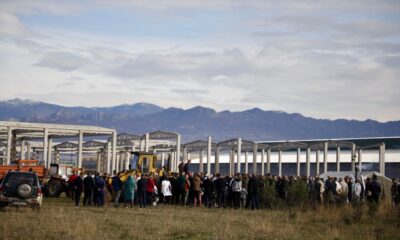World
Government Tax Policies Threaten Farming Future and Food Security

Government tax policies are drawing criticism for their potential to undermine the future of farming and threaten food security. Many stakeholders, particularly farmers, are voicing concerns that the current approach is short-sighted and detrimental to sustainable agricultural practices.
The government’s recent tax measures have sparked outrage among farmers who believe these policies do not consider the unique challenges of agriculture. Critics argue that the tax structure is a “destructive tax grab” that disproportionately affects those who provide essential food supplies. As farmers face increasing operational costs, these new financial burdens could significantly impact crop yields and local economies.
Consequences for Farmers and Communities
Farmers play a vital role in ensuring food availability and maintaining local economies. According to a report by the International Food Policy Research Institute, **agriculture** accounts for approximately **4%** of global GDP and employs over **1 billion people** worldwide. The proposed tax increases could further strain farmers’ already tight margins, jeopardizing their livelihoods and the agricultural sector’s long-term viability.
Concerns about food security have been raised amid predictions that the agricultural sector could see reduced productivity. For instance, the World Bank forecasts that if farmer incomes decline, food prices may rise, leading to increased hunger and malnutrition rates. Local communities often rely on farmers not only for food but for jobs and economic stability.
The call for a re-evaluation of tax policies is gaining momentum. Many local farming organizations are urging the government to consider alternative approaches that would support farmers rather than burden them. They advocate for tax incentives linked to sustainable farming practices that can bolster resilience against climate change while maintaining productivity.
Rethinking Agricultural Policies
Experts suggest that a comprehensive review of agricultural tax policies could lead to more balanced solutions. Encouraging sustainable farming methods could enhance environmental protection while ensuring food supply stability. The shift towards eco-friendly practices, such as crop rotation and organic farming, may yield benefits for farmers and the broader community.
The government is urged to engage in dialogue with stakeholders to understand the practical implications of tax policies on farming. An inclusive approach would not only address the immediate concerns of farmers but also promote long-term food security and sustainability.
As discussions on tax reform continue, the implications for farming and food security remain critical. With the right policies, it is possible to support the agricultural sector while ensuring the sustainability of food systems for future generations. The time to act is now, before the negative effects of current tax measures become irreversible.
-

 World6 days ago
World6 days agoCoronation Street’s Shocking Murder Twist Reveals Family Secrets
-

 Entertainment4 months ago
Entertainment4 months agoKate Garraway Sells £2 Million Home Amid Financial Struggles
-

 Entertainment3 months ago
Entertainment3 months agoAnn Ming Reflects on ITV’s ‘I Fought the Law’ Drama
-

 Entertainment3 days ago
Entertainment3 days agoAndrew Pierce Confirms Departure from ITV’s Good Morning Britain
-

 Health3 months ago
Health3 months agoKatie Price Faces New Health Concerns After Cancer Symptoms Resurface
-

 Entertainment4 weeks ago
Entertainment4 weeks agoCoronation Street Fans React as Todd Faces Heartbreaking Choice
-

 World4 weeks ago
World4 weeks agoBailey Announces Heartbreaking Split from Rebecca After Reunion
-

 Entertainment1 week ago
Entertainment1 week agoTwo Stars Evicted from I’m A Celebrity Just Days Before Finale
-

 World1 week ago
World1 week agoKevin Sinfield Exceeds Fundraising Goal Ahead of Final Marathons
-

 Entertainment3 months ago
Entertainment3 months agoCoronation Street’s Carl Webster Faces Trouble with New Affairs
-

 Entertainment3 months ago
Entertainment3 months agoWhere is Tinder Swindler Simon Leviev? Latest Updates Revealed
-

 Entertainment4 months ago
Entertainment4 months agoMarkiplier Addresses AI Controversy During Livestream Response





















